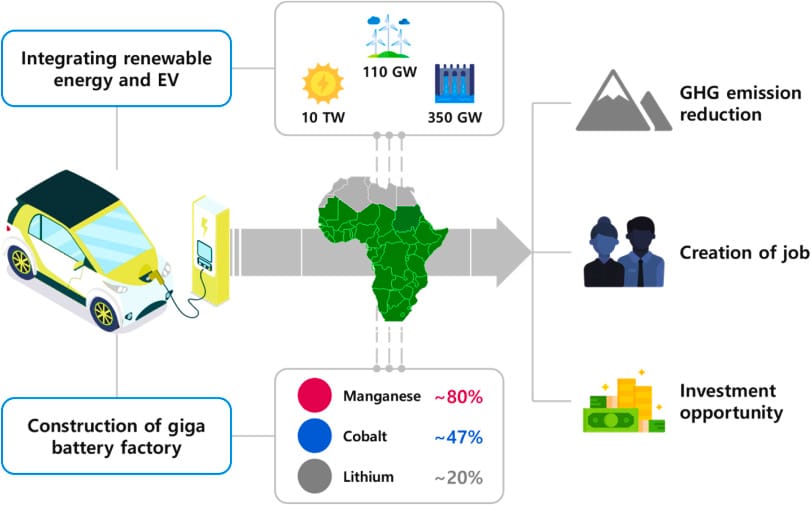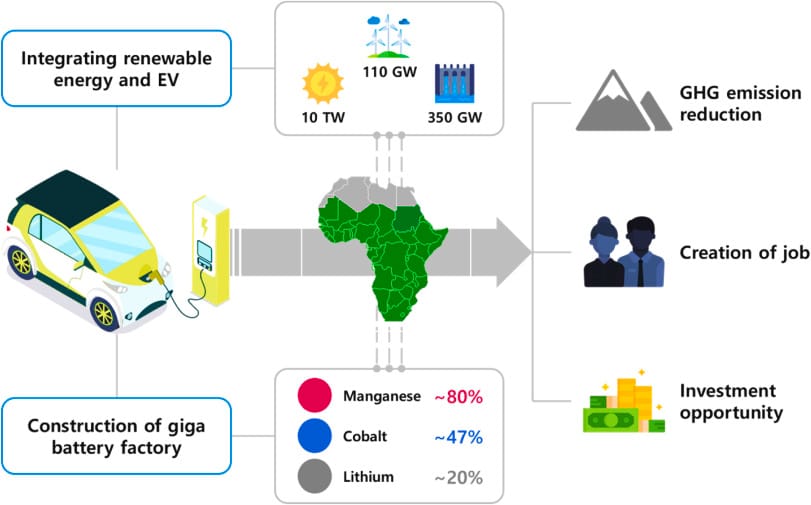Driving Forward: Africa's Electric Vehicle Landscape.


Despite facing recent headwinds, the momentum towards electric vehicle (EV) adoption in Africa remains steadfast.
According to a 2024 report by market research firm Rho Motion, global sales of fully electric and plug-in hybrid vehicles surged by 31% compared to 2022, underscoring a growing appetite for sustainable transportation solutions worldwide.
While challenges such as high conversion costs and inadequate infrastructure persist, several African countries are forging ahead with remarkable progress in the EV space.
Here's a curated list of ten African countries leading the charge in electric vehicle adoption, encompassing a variety of vehicle types, including two, three, and four-wheelers:
1. South Africa:
As one of the continent's largest automotive markets, South Africa has emerged as a key player in the EV arena.
The country boasts a growing fleet of electric vehicles, fueled by supportive government policies and increasing consumer awareness.
Major automakers have introduced electric models tailored to the South African market, driving further momentum towards electrification.
In 2020, there were about 6,000 electric automobiles in SA (both fully electric and hybrid), according to government projections.
The country is also exploring the possibility of manufacturing EVs, with the first electric vehicle fully manufactured in the country expected to be ready by 2026, according to the trade minister.
Naamsa (the National Association of Automobile Manufacturers of South Africa) expects at least 8 new EV products to be introduced in the country in 2024.
2. Kenya:
Kenya has made significant strides in promoting electric mobility as part of its efforts to mitigate urban pollution and reduce reliance on fossil fuels.
The Kenyan government's incentives, including tax breaks and import duty exemptions for EVs, have spurred uptake among consumers.
Notably, the introduction of electric motorcycle taxis, or e-motors, has revolutionized urban transportation in cities like Nairobi.
Statistics by the Energy and Petroleum Regulatory Authority ( EPRA) released in April 2024 show the number of EV registrations stood at 3753 as of 2023. Between July and December 2023, 2694 new EVs were registered, thanks to wide-ranging incentives implemented last year.
While the number of fully electric four-wheelers is still low (less than 500), according to Afema, increasing investor activity by companies such as BasiGo and Roam promises to increase the numbers.
Kenya recently unveiled its first Electric Mobility (e-mobility) Draft Policy, which outlines policy guidelines in the sector as it pursues a target of having 5% of all vehicle registrations in the country be electric by 2025.
3. Rwanda:
In 2022, UNEP reported nearly 900 electric vehicles, including motorcycles and three-wheelers, zipping around Rwanda.
Rwanda has positioned itself as a leader in electric mobility on the African continent.
Forward-thinking policies, coupled with strategic partnerships with international companies, have facilitated the adoption of electric vehicles in the country.
Rwanda's embrace of electric motorcycle taxis, known as e-motors, exemplifies its commitment to sustainable transportation solutions.
That number is on the rise, driven by supportive government policies fueling a boom in EV-related businesses.
Notably, Tesla has entered the Rwandan scene with its Model Y, joining players like BYD from China.
The arrival of Kenyan startup BasiGo further underscores Rwanda's commitment to electrifying transportation. Afema notes that Rwanda currently boasts 1,182 two and three-wheelers.
4. Morocco:
Morocco has embraced electric mobility as part of its sustainable development agenda, investing in infrastructure and fostering a conducive policy environment.
The country's strategic location has positioned it as a hub for electric vehicle manufacturing, with both domestic and international companies establishing production facilities.
Morocco's commitment to electrification is driving significant progress in the EV sector.
As of 2022 Morocco’s EV fleet included more than 10,000 hybrid vehicles, according to ‘Société Nationale des Autoroutes du Maroc’, Morocco's national authority for the management of expressways.
Like South Africa, Morocco boasts a vibrant vehicle manufacturing industry, including world-renowned car makers such as Renault and Stellantis.
The country is targeting the production of 1 million cars of all types by 2025.
Part of the plan is to have EVs represent up to 60% of car exports by 2030.
Ongoing investments in battery manufacturing could expedite these ambitions.
5. Ghana:
Ghana is making notable strides towards electric mobility, spurred by efforts to address urban pollution and enhance energy security.
The Ghanaian government's initiatives to develop a supportive policy framework for EVs, coupled with partnerships with international organizations, are driving awareness and infrastructure development.
Ghana's potential as a market for electric vehicles is gaining traction among manufacturers and investors alike.
Approximately 17,000 electric vehicles, including 2 and 3-wheelers, are currently registered in the country according to government data.
Ghana also boasts one of the largest EV four-wheeler fleets in Africa, with about 1,000 tracked in the Africa e-mobility alliance’s 2023 report.
In the 2023/24 Budget Speech, the Minister for Finance and Economic Planning unveiled Ghana's ambitious strategy to boost the EV sector.
This includes waiving import duties on EVs for 8 years, starting in 2024.
This initiative also includes exemptions on import duties for semi-knocked down and completely knocked down EVs imported by registered assembly companies and an extension of VAT exemptions on locally assembled vehicles for 2 more years
6. Nigeria:
Nigeria, as Africa's most populous country, presents immense opportunities for electric vehicle adoption.
Despite facing infrastructure challenges and economic constraints, Nigeria is witnessing a growing interest in electric mobility.
Initiatives to incentivize EV purchases and expand charging infrastructure are underway, signaling a shift towards cleaner transportation solutions in the country.
7. Egypt:
Egypt has embarked on a journey towards electrification, driven by a commitment to reduce emissions and enhance energy efficiency.
The Egyptian government's initiatives to promote electric vehicles, coupled with investments in charging infrastructure, are laying the groundwork for widespread adoption.
As one of Africa's largest automotive markets, Egypt holds significant potential for the growth of electric mobility.
8. Uganda:
Uganda is emerging as a promising market for electric vehicles, particularly in the realm of e-mobility solutions for urban transportation.
The Ugandan government's efforts to promote EV adoption, combined with collaborations with international partners, are driving progress in the sector.
Electric buses and motorcycles are gaining traction in cities like Kampala, offering clean and efficient transport options.
9. Tunisia:
Tunisia is embracing electric mobility as part of its strategy to reduce dependence on fossil fuels and combat climate change.
The Tunisian government's incentives for EV buyers, along with investments in charging infrastructure, are catalyzing the transition towards cleaner transportation.
Electric vehicles are increasingly becoming a viable option for Tunisian consumers, contributing to the country's sustainable development goals.
10. Ivory Coast:
Ivory Coast is taking steps towards embracing electric mobility, motivated by a desire to address environmental concerns and promote sustainable transportation solutions.
The Ivorian government's initiatives to encourage EV adoption, coupled with collaborations with international partners, are driving momentum in the sector.
Electric vehicles are gaining visibility in cities like Abidjan, offering a glimpse into the future of urban mobility in the country.
- Ethiopia
According to estimates from Cleantechnica.com, as of 2023, there were some 5,000 to 7,000 electric vehicles on the roads of Ethiopia, with the sector experiencing significant growth thanks to government incentives.
The incentives include VAT, surtax, and excise tax exemptions for all EVs and customs duty tax exemptions for completely knocked-down kits.
The Ministry of Transport and Logistics aims to import a minimum of 4,800 electric buses and 148,000 electric automobiles over the next decade, part of a plan to accelerate EV adoption in the country.
- Tanzania
Tanzania has grown into one of the biggest electric vehicle markets in Africa with electric two and three-wheelers being the dominant category in the country’s roads.
A 2023 report by the Africa e-mobility Alliance estimated the number of EVs in Tanzania at 5000 vehicles.
While the number of electric four-wheelers remains low, there are still a few recent entries from major dealers, including the Tesla Model S, Renault Zoe, Nissan Leaf, and BMW i3,.
- Angola
Angola has one of the highest numbers of electric four-wheelers in Africa, with estimates by the Africa E-mobility Alliance showing up to 1000 electric four-wheelers.
Policies introduced in 2022 offer import and vehicle tax reductions until 2032. The country is developing an electro-mobility strategic plan to accelerate growth in the sector.
A 2023 report by CVE Angola, an EV company, shows an additional two thousand EV imports from the United States in 2024.
- Egypt
Multiple estimates from industry professionals suggest there were between 3500 and 4000 EVs in Egypt in 2023, almost double the 1,000 to 1,800 in 2021.
According to Afema, the number of four-wheeler EVs is still modest, estimated at 380 as of 2023. 155 of these were electric buses deployed when the country hosted COP 27.
The government has an ambitious plan to encourage local EV production, with up to 100,000 units targeted in a few years.
To meet this, the government plans to cover up to 35% of the costs per unit of EV produced locally to encourage the local industry.
- Benin
With over 3000 electric vehicles, mainly electric motorcycles, Benin is also emerging as a major player in EV adoption in West Africa.
Private clean mobility startups such as Spiro are heralding the shift of the more than 150000 motorcycles in the country to use electric engines.
The transformative shift in the country is further evidenced by significant investment in charging infrastructure.
While challenges such as high conversion costs and infrastructure limitations persist, the growing adoption of electric vehicles across these African countries signals a promising shift toward sustainable transportation solutions.
With continued investment, innovation, and collaboration, Africa is poised to play a pivotal role in shaping the future of electric mobility on the global stage.




